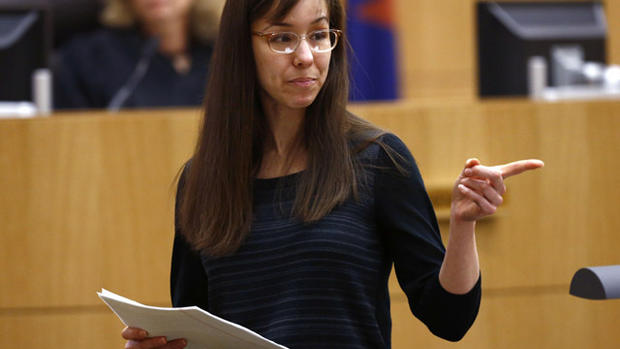Jodi Arias Update: Judge delays decision on next move towards penalty phase
PICTURES: Jodi Arias pleads with jurors for a life sentence
A shackled Arias walked into court escorted by several jail officers and briefly sat at the defense table as lawyers met privately in the chambers of Judge Sherry Stephens. The judge scheduled another hearing for July 18, the date a new penalty phase had been tentatively scheduled to start.
The proceeding lacked the sizzle of the five-month trial that attracted a global following and had spectators waiting in line in the middle of the night to get a coveted seat in the courtroom. On Thursday, the courtroom was about two-thirds full, the hearing was not televised, and there were no arguments in open court.
READ: Jodi Arias: A timeline of a sensational murder case
Arias was found guilty of first-degree murder on May 8 in the June 2008 stabbing and shooting death of boyfriend Travis Alexander at his suburban Phoenix home. About two weeks later, the same jury failed to reach a unanimous decision on whether to sentence Arias to life in prison or death.
While the murder conviction will stand, a new penalty phase must occur to decide Arias' punishment. It will be a mini-trial of sorts to get a fresh jury up to speed on the case. Jury selection alone could take weeks, given the difficulty of seating an impartial panel in the high-profile case.
Prosecutors have the option of taking the death penalty off the table, and Stephens would then sentence Arias to one of two punishments: life in prison or the more unlikely life in prison with the possibility of release after 25 years.
If prosecutors do pursue death, a new panel must be seated to determine a sentence. If another deadlock occurs, the death penalty would automatically be removed, leaving the judge to sentence Arias to one of the life-in-prison options.
Maricopa County Attorney Bill Montgomery said last week his office continues to prepare for a retrial aimed at securing a death sentence. He had previously said he is confident an impartial jury can be seated to determine Arias' punishment but added that he is open to input from defense lawyers and the victim's family about possibly scrapping a new trial in favor of a life sentence for Arias.
Meanwhile, after losing motions for mistrials, appeals to higher courts and efforts to quit the case altogether, Arias' attorneys tried a new tactic this month, appealing to the court of public opinion while hoping to influence Montgomery's decision.
"It is solely for them to determine if continuing to pursue a death sentence upon Ms. Arias, who is already facing a mandatory life sentence, is a good and proper use of taxpayer resources," defense attorneys Kirk Nurmi and Jennifer Willmott wrote in a statement provided to The Arizona Republic.
Taxpayers footed the bill for Arias' court-appointed attorneys at a cost so far of nearly $1.7 million, a price tag that will only balloon if the case moves forward.
Arias, 32, admitted she killed Alexander, but claimed it was self-defense after he attacked her. Prosecutors argued it was premeditated murder carried out in a jealous rage after the victim wanted to end their affair and planned a trip to Mexico with another woman.
Arias stabbed and slashed Alexander nearly 30 times, slit his throat so deeply she nearly decapitated him and shot him in the forehead. She then left his body in his shower where friends found him about five days later. She testified for 18 days during her four-month trial, describing for jurors an abusive childhood, cheating boyfriends, dead-end jobs, a shocking sexual relationship with Alexander, and her contention that he had grown physically abusive.
Complete coverage of the Jodi Arias trial on Crimesider

